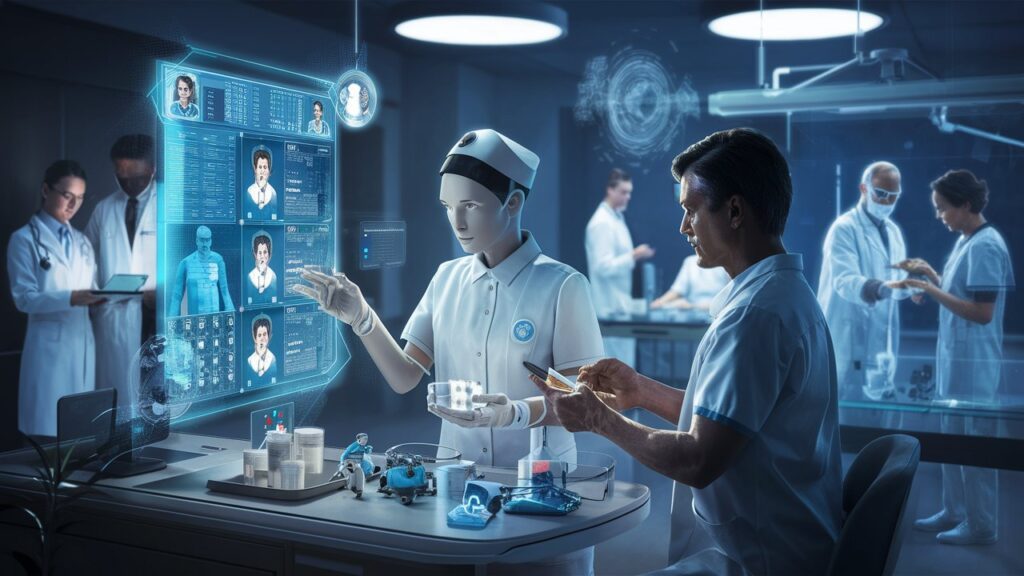
The integration of Artificial Intelligence (AI) in healthcare is nothing short of a revolution. As technology continues to evolve, AI is making waves in patient care, improving diagnostics, treatment plans, and overall patient outcomes. This blog explores the transformative impact of AI in healthcare, highlighting its benefits, challenges, and future prospects.
What is AI in Healthcare?

AI in healthcare refers to the use of machine learning algorithms and software to mimic human cognition in the analysis, interpretation, and comprehension of complex medical and healthcare data. These AI systems can perform tasks that typically require human intelligence, such as diagnosing diseases, personalizing treatment plans, and predicting patient outcomes.
The Role of AI in Healthcare Diagnostics
One of the most significant areas where AI in healthcare has made an impact is in diagnostics. Traditional diagnostic methods can be time-consuming and prone to human error. AI-powered diagnostic tools, however, can analyze medical images and data with remarkable accuracy and speed. For example, AI algorithms can detect early signs of diseases like cancer, diabetes, and heart conditions from medical images and patient data, enabling earlier and more effective treatment.
Enhancing Treatment Plans
AI in healthcare is also revolutionizing treatment plans. Personalized medicine, which tailors treatment to individual patients, has become more achievable with AI. By analyzing a patient’s genetic information, lifestyle, and other factors, AI can suggest the most effective treatment options. This personalized approach not only improves patient outcomes but also reduces the risk of adverse reactions to treatments.
AI in Healthcare and Drug Discovery
The pharmaceutical industry is benefiting immensely from AI in healthcare. The traditional drug discovery process is lengthy and costly, often taking years and billions of dollars. AI can expedite this process by predicting which drug formulations will be most effective for specific conditions. This acceleration in drug discovery means that new treatments can reach patients faster, potentially saving countless lives.
AI in Healthcare: Improving Patient Monitoring
It extends beyond diagnostics and treatment to patient monitoring. Wearable devices and sensors can continuously monitor a patient’s vital signs and health metrics. These devices use AI algorithms to analyze the data in real-time, alerting healthcare providers to any abnormalities or potential health issues. This continuous monitoring can be particularly beneficial for patients with chronic conditions, ensuring they receive timely intervention when needed.
The Benefits of AI in Healthcare Administration
AI in healthcare is not limited to patient care; it also offers significant benefits in healthcare administration. By automating administrative tasks such as scheduling, billing, and patient record management, AI can reduce the administrative burden on healthcare providers. This allows them to focus more on patient care and less on paperwork, ultimately improving the overall efficiency of healthcare services.
Challenges and Ethical Considerations
While the advantages of AI in healthcare are undeniable, there are also challenges and ethical considerations that need to be addressed. Data privacy is a significant concern, as AI systems require access to vast amounts of patient data. Ensuring that this data is stored securely and used ethically is paramount. Additionally, there is the challenge of ensuring that AI systems are transparent and explainable, so healthcare providers can trust and understand the decisions made by these systems.
AI in Healthcare: The Importance of Human Oversight
Despite the advancements in AI, human oversight remains crucial. AI should be viewed as a tool to assist healthcare providers, not replace them. Human intuition, empathy, and critical thinking are irreplaceable in patient care. Therefore, a collaborative approach where AI supports healthcare professionals is essential for the best patient outcomes.
The Future of AI in Healthcare
The future is incredibly promising. As technology continues to advance, we can expect even more sophisticated AI systems that can handle more complex tasks. For example, AI could potentially predict disease outbreaks by analyzing patterns in large datasets, enabling preventative measures to be put in place. Additionally, AI could further personalize healthcare, providing tailored wellness plans to individuals based on their unique genetic makeup and lifestyle.
AI in Healthcare: A Global Perspectived
The potential to make a significant impact on a global scale. In developing countries with limited access to healthcare professionals, AI-powered diagnostic tools can provide much-needed medical expertise. This can bridge the gap in healthcare access and ensure that more people receive the care they need.
Conclusion
The integration is revolutionizing patient care. From improving diagnostics and treatment plans to enhancing patient monitoring and administrative efficiency, AI offers numerous benefits. However, it is essential to address the challenges and ethical considerations to ensure the responsible use. With continued advancements and a collaborative approach, the future looks bright, promising improved patient outcomes and more efficient healthcare services.
By embracing , we are taking significant strides towards a future where healthcare is more personalized, efficient, and accessible to all. The journey has just begun, and the potential for AI to revolutionize patient care is limitless.
This comprehensive look at demonstrates its transformative potential. As we continue to innovate and integrate these technologies, we must remain mindful of the ethical considerations and ensure that human oversight remains a crucial component of patient care. The future is not just about technology but about improving the lives of patients around the world.
One thought on “AI in Healthcare: Revolutionising Patient Care”